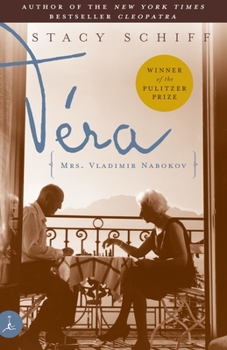Vera (Mrs.Vladimir Nabokov)
Select Format
Select Condition 
Book Overview
"Utterly romantic."--New York magazine
"Deeply moving."--The Seattle Times Stacy Schiff brings to shimmering life one of the greatest literary love stories of our time: Vladimir Nabokov, ?migr? author of Lolita; Pale Fire; and Speak, Memory, and his beloved wife, V?ra. Nabokov wrote his books first for himself, second for his wife, and third for no one at all. "Without my wife," he once noted, "I wouldn't have written a single novel." Set in prewar Europe and postwar America, spanning much of the twentieth century, the story of the Nabokovs' fifty-two-year marriage reads as vividly as a novel. V?ra, both beautiful and brilliant, is its outsized heroine--a woman who loves as deeply and intelligently as did the great romantic heroines of Austen and Tolstoy. Stacy Schiff's V?ra is a triumph of the biographical form.
Customer Reviews
Rated 5 starsA stunning look into the intricacies of marriage
Even without the Pulitzer Prize, which this book won for Biography, Schiff's scrupulously written paean to marriage--well, to one complex marriage in particular--would stand out as an extraordinary achievement. Including vivid writing that reminds one of the best fiction, and strong research that follows the trajectory of two strong-willed "characters," Vera and Vladimir, this is a work of Richard Ellmann-like quality, and...
1Report
Rated 5 starsThe Ultimate Woman Behind the Man
"Vera was a pale blonde when I met her, but it didn't take me long to turn her hair white."The above was taken from one of Nabokov's own journal entries and, although it may seem humorous, it is no doubt true. Pulitzer-Prize winner, Stacy Schiff, suggests, even in the title of her book, that Véra Nabokov was a woman who was only capable of being known as Mrs. Vladimir Nabokov. Her relationship with her famed husband, no...
2Report
Rated 5 starsGORGEOUSLY WRITTEN AND BRILLIANTLY PUT TOGETHER
This was a biography I found spellbinding as much for the force of its story as for the beauty of its language. There are hidden pleasures here as there are in Nabokov; each one makes you feel that a first-rate biographical intelligence is at work. And I can't say I've ever read a better portrait of Nabokov, anywhere. None of his chroniclers write with anything close to Schiff's style or sensitivity. Not to mention...
1Report
Rated 5 starsWitty, subtle, perceptive, and elegantly written
Literary biography rarely gets as good as this: a witty, subtle, perceptive, and elegantly written portrait. Wonderfully researched, Vera is also the product of a first-rate mind. How lucky Vera Nabokov is to draw Stacy Schiff as her biographer. I am simply in awe.
1Report
Rated 5 starsAn awesome job on a seemingly impossible task
This is the book Nabokov fans have been waiting for, but suspected would never (COULD never) be written. From the opening sentences it's clear that Schiff has the stuff equal to her daunting task--to get behind the artfully constructed public face of two of the most brilliant, but most private, people ever to enter the public eye. Schiff does it with awesome research and a, by turns, witty, moving, penetrating, sometimes...
1Report












